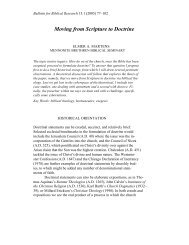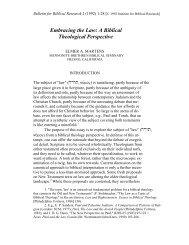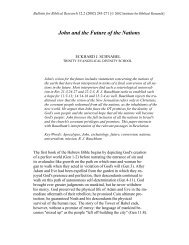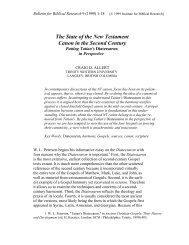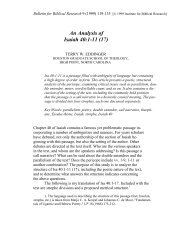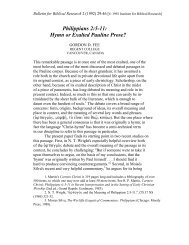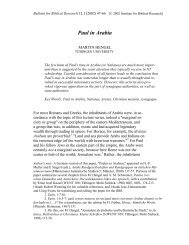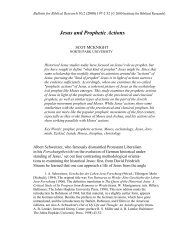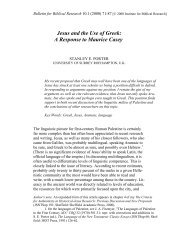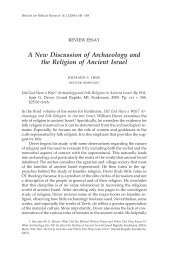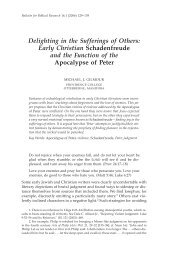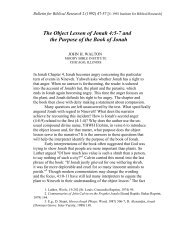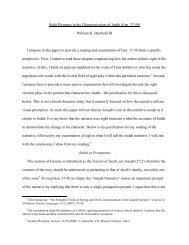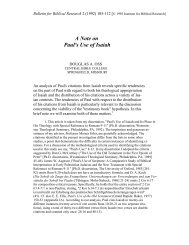The Integrity of the Biblical Canon in Light of Its Historical ...
The Integrity of the Biblical Canon in Light of Its Historical ...
The Integrity of the Biblical Canon in Light of Its Historical ...
Create successful ePaper yourself
Turn your PDF publications into a flip-book with our unique Google optimized e-Paper software.
MCDONALD: <strong>The</strong> <strong>Integrity</strong> <strong>of</strong> <strong>the</strong> <strong>Biblical</strong> <strong>Canon</strong> 113<br />
C. Freedman's Alternative: An Early Twenty-Three Book <strong>Canon</strong><br />
David Noel Freedman, on <strong>the</strong> basis <strong>of</strong> his discovery <strong>of</strong> <strong>the</strong> symmetry<br />
<strong>of</strong> <strong>the</strong> Hebrew Bible, 42 contends that, except for <strong>the</strong> Book <strong>of</strong> Daniel,<br />
<strong>the</strong> whole <strong>of</strong> <strong>the</strong> OT biblical canon was closed for all <strong>in</strong>tents and<br />
purposes no later than <strong>the</strong> fifth century BCE and that <strong>the</strong> Law and<br />
Former Prophets (Joshua through K<strong>in</strong>gs) were recognized as canonical<br />
scripture <strong>in</strong> Babylon before <strong>the</strong> Jews returned to <strong>the</strong> Land <strong>of</strong> Israel<br />
<strong>in</strong> 538 BCE 43 He says that <strong>the</strong> orig<strong>in</strong>al fixed Hebrew biblical canon<br />
was a twenty-three book collection without <strong>the</strong> Book <strong>of</strong> Daniel and that<br />
<strong>the</strong> biblical canon was consciously determ<strong>in</strong>ed along symmetrical<br />
l<strong>in</strong>es roughly between 400 and 350 BCE, though he is not dogmatic<br />
about <strong>the</strong> date. 44 Because <strong>the</strong>re appears to be a well-balanced symmetry<br />
<strong>of</strong> <strong>the</strong> two major parts <strong>of</strong> <strong>the</strong> Hebrew Bible, he concludes that<br />
<strong>the</strong> editor(s)/collector(s) put <strong>the</strong>se parts toge<strong>the</strong>r with such a balance<br />
<strong>in</strong> m<strong>in</strong>d. 45 Freedman shows that <strong>the</strong> five books <strong>of</strong> <strong>the</strong> Torah are balanced<br />
with <strong>the</strong> five major Ketubim (Chronicles, Job, Psalms, Proverbs,<br />
Ezra-Nehemiah) which is also balanced with <strong>the</strong> five megillot (Ruth,<br />
Song <strong>of</strong> Songs, Ecclesiastes, Lamentations, and Es<strong>the</strong>r). 46 <strong>The</strong> Former<br />
Prophets conta<strong>in</strong><strong>in</strong>g four major books (Joshua, Judges, <strong>the</strong> Samuels<br />
42. David Noel Freedman argues that <strong>the</strong> f<strong>in</strong>alization <strong>of</strong> <strong>the</strong> Hebrew Scriptures,<br />
except for <strong>the</strong> Book <strong>of</strong> Daniel, took place no later than between 400-350 BCE, but that<br />
<strong>the</strong> Law and <strong>the</strong> Former Prophets (Joshua through K<strong>in</strong>gs), were completed <strong>in</strong> Babylon<br />
before <strong>the</strong> return <strong>of</strong> <strong>the</strong> Jews from Exile <strong>in</strong> 538 BCE ("<strong>The</strong> Symmetry <strong>of</strong> <strong>the</strong> Hebrew<br />
Bible," ST 46 [1992] 83-108, here 102-5; see his "<strong>The</strong> Earliest Bible," 29-37, here 29 and<br />
his more recent "<strong>The</strong> Symmetry <strong>of</strong> <strong>the</strong> Hebrew Bible," ST 46 [1992] 83-108). Freedman<br />
claims that without <strong>the</strong> Book <strong>of</strong> Daniel <strong>the</strong> two parts <strong>of</strong> <strong>the</strong> Hebrew Scriptures are<br />
evenly balanced, and this demonstrates for him <strong>the</strong> specific <strong>in</strong>tentions <strong>of</strong> those <strong>in</strong> <strong>the</strong><br />
time <strong>of</strong> Ezra-Nehemiah to develop a well-balanced collection <strong>of</strong> Scriptures. He acknowledges<br />
that certa<strong>in</strong> o<strong>the</strong>r books may have been late (Es<strong>the</strong>r and Ecclesiastes), but<br />
that does not alter his picture by much. He is conv<strong>in</strong>ced that "without Daniel, <strong>the</strong> rest<br />
<strong>of</strong> <strong>the</strong> Hebrew Bible as we have it reflects a symmetry that is astonish<strong>in</strong>gly exact (as exact<br />
as is likely <strong>in</strong> literary productions ra<strong>the</strong>r than ma<strong>the</strong>matical ones)" (Freedman,<br />
"Symmetry" 94). He claims that "if we consider numerical symmetry an important factor,<br />
<strong>the</strong>n <strong>the</strong>re is really no choice: <strong>the</strong>re was only one moment when <strong>the</strong> Bible and <strong>the</strong><br />
alphabet co<strong>in</strong>cided and all <strong>the</strong> editorial factors were present. It was precisely <strong>in</strong> this<br />
period (postexilic, Babylonian and Persian)" (p. 104).<br />
43. Freedman, "Symmetry," 102-5.<br />
44. Freedman, "Symmetry," 83-108.<br />
45. <strong>The</strong> Torah and <strong>the</strong> Former Prophets have roughly 150,000 words compared to<br />
<strong>the</strong> second part conta<strong>in</strong><strong>in</strong>g <strong>the</strong> Latter Prophets and <strong>the</strong> Writ<strong>in</strong>gs, which also have<br />
approximately 150,000 words. More specifically, Freedman has shown that <strong>the</strong>re are<br />
79,983 words <strong>in</strong> <strong>the</strong> Torah and 69,658 words <strong>in</strong> <strong>the</strong> Former Prophets (=149,641). <strong>The</strong><br />
Latter Prophets have 71,852 words and <strong>the</strong> Writ<strong>in</strong>gs have 78,085 words (=149,937).<br />
46. He also observes that Chronicles comes first <strong>in</strong> order <strong>of</strong> <strong>the</strong> Ketubim <strong>in</strong> both <strong>the</strong><br />
Aleppo Codex and <strong>the</strong> Len<strong>in</strong>grad Codex and believes that Chronicles was orig<strong>in</strong>ally<br />
<strong>in</strong>tended to be <strong>in</strong> first place s<strong>in</strong>ce <strong>the</strong> conclud<strong>in</strong>g paragraph <strong>in</strong> Chronicles and <strong>the</strong><br />
open<strong>in</strong>g paragraph <strong>in</strong> Ezra are essentially <strong>the</strong> same and such an overlap would not be



